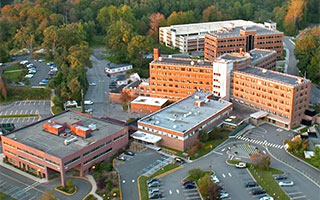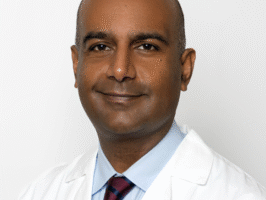 According to the National Center for Health Statistics, USA, approximately 5 million Americans have a hernia, with an estimated 800,000 people developing a new abdominal hernia annually. Yet, only about 750,000 people seek treatment each year.
According to the National Center for Health Statistics, USA, approximately 5 million Americans have a hernia, with an estimated 800,000 people developing a new abdominal hernia annually. Yet, only about 750,000 people seek treatment each year.
The only way to repair a hernia is through surgery, and this may be the reason why there are so many people living with one. They may fear they will have to undergo a major invasive procedure that will have a long, painful recovery. Today, such fears are generally unfounded, because hernia procedures have evolved from the old “open” technique to quick, safe, minimally invasive procedures.
What is a hernia? A hernia occurs when a weakness in the wall or muscle that holds an organ in place allows the organ to push through, creating a bulge. Some hernias are present at birth, some appear suddenly, and others develop slowly over time. Hernias are usually not life-threatening but can be if they become strangulated.
Diagnosis. If a hernia is suspected, a visit to a primary care physician or a hernia specialist is recommended. Sometimes, what seems to be a hernia is actually a muscle pull or groin sprain. A physician experienced in treating hernias has the expertise to tell the difference. If a hernia is small and painless, the doctor may just look at it periodically and give advice to avoid straining. If it becomes large or painful, surgery is usually the best option.
Surgery. A surgeon’s skill and the type of hernia operation will influence the time it takes for recovery and, more importantly, whether the hernia will recur. There are two common surgical approaches:
- Open surgery involves larger incisions, more trauma to surrounding tissue, and a longer recovery period than laparoscopic surgery.
- Laparoscopic surgery uses small incisions, a tiny camera and specialized surgical skill. A smaller amount of anesthesia, which can be from used anesthesia machines, is needed than with open surgery, and there is less pain, less risk for infection and less scarring. Patients are able to return to their normal activities quickly.
The Phelps Memorial Hospital Hernia Center has been established under the medical direction of surgeon Har Chi Lau, MD, to provide patients with expert diagnosis and specialized treatment for all types of hernias.
A typical laparoscopic hernia operation involves four small incisions – one for the camera and three through which the hands perform the procedure. “When I perform laparoscopic hernia surgery,” says Dr. Lau, “I do everything with one hand, so only two incisions are needed – one for the camera and one for my hand.”
The tear in the muscle is repaired with surgical mesh. Preferring not to use standard-sized mesh, Dr. Lau customizes the mesh size and shape to fit each patient exactly, which is why hernia recurrence is rare among his patients.
Dr. Lau is a board-certified surgeon with expertise in minimally invasive surgery. He earned his medical degree from the Medical College of Pennsylvania and completed his
surgery residency and internship at Allegheny University Hospital.
[blockquote class=blue]The Phelps Hernia Center is located on the Phelps campus (1-888-888-2311). [/blockquote]






